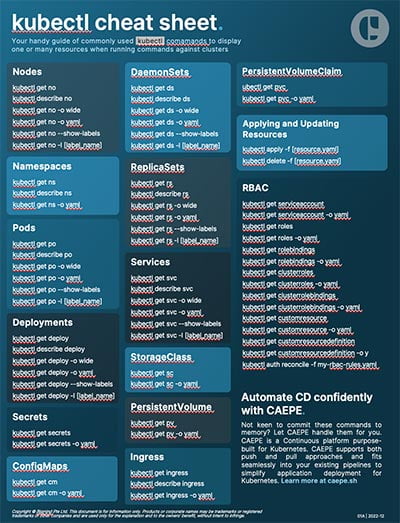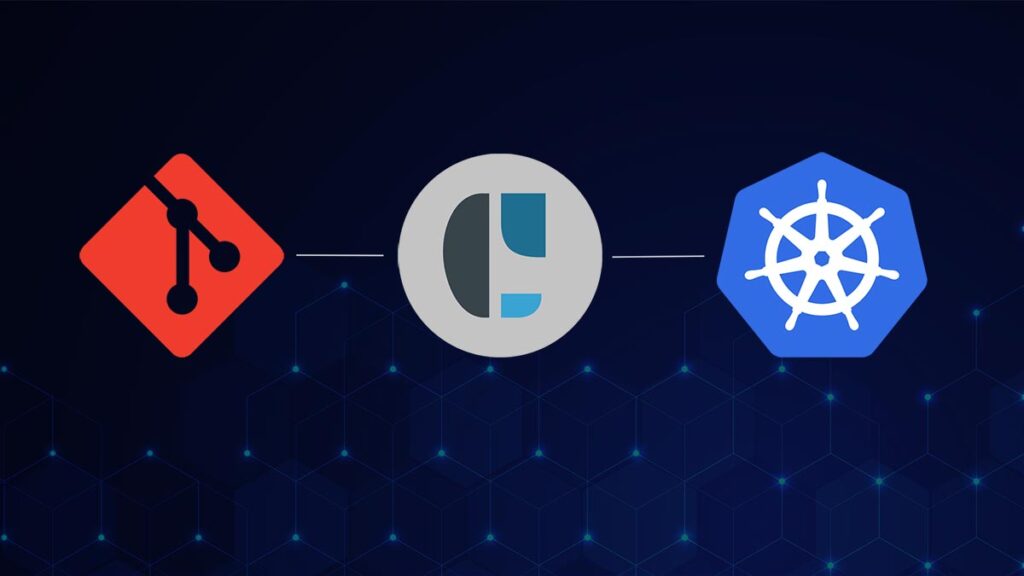Your handy guide of commonly used kubectl commands to display one or many resources when running commands against clusters. Click to copy to clipboard easily, or download the PDF cheatsheet as a useful reference.
Nodes
kubectl get nokubectl describe nokubectl get no -o widekubectl get no -o yamlkubectl get no --show-labelskubectl get no -l [label_name]Namespaces
kubectl get nskubectl describe nskubectl get ns -o yamlPods
kubectl get pokubectl describe pokubectl get po -o widekubectl get po -o yamlkubectl get po --show-labelskubectl get po -l [label_name]Deployments
kubectl get deploykubectl describe deploykubectl get deploy -o widekubectl get deploy -o yamlkubectl get deploy --show-labelskubectl get deploy -l [label_name]DaemonSets
kubectl get nokubectl describe nokubectl get no -o widekubectl get no -o yamlkubectl get no --show-labelskubectl get no -l [label_name]ReplicaSets
kubectl get nskubectl describe nskubectl get ns -o yamlServices
kubectl get svckubectl describe svckubectl get svc -o widekubectl get svc -o yamlkubectl get svc --show-labelskubectl get svc -l [label_name]RBAC
kubectl get serviceaccountkubectl get serviceaccount -o yamlkubectl get roleskubectl get roles -o yamlkubectl get rolebindingskubectl get rolebindings -o yamlkubectl get clusterroleskubectl get clusterroles -o yamlkubectl get clusterrolebindingskubectl get clusterrolebindings -o yamlkubectl get customresourcekubectl get customresource -o yamlkubectl get customresourcedefinitionkubectl get customresourcedefinition -o ykubectl auth reconcile -f my-rbac-rules.yamlSecrets
kubectl get secretskubectl get secrets -o yamlConfigMaps
kubectl get cmkubectl get cm -o yamlStorageClass
kubectl get sckubectl get sc -o yamlPersistentVolume
kubectl get pvkubectl get pv -o yamlPersistentVolumeClaim
ubectl get pvckubectl get pvc -o yamlIngress
kubectl get ingresskubectl describe ingresskubectl get ingress -o yamlApplying and Updating Resources
kubectl apply -f [resource.yaml]kubectl delete -f [resource.yaml]
CAEPE Continuous Deployment
Manage workloads on Kubernetes anywhere robustly and securely.
- Shores up security by simplifying deployment anywhere, supporting managed services, native Kubernetes, self-hosted, edge and secure airgapped deployment targets.
- Supports GitOps and provides guided, UI-driven workflows for all major progressive delivery strategies.
- Has RBAC built-in, providing inherent enterprise access control for who can deploy.
- Supports extended testing capabilities enabling your team to run different tests quickly and easily.



